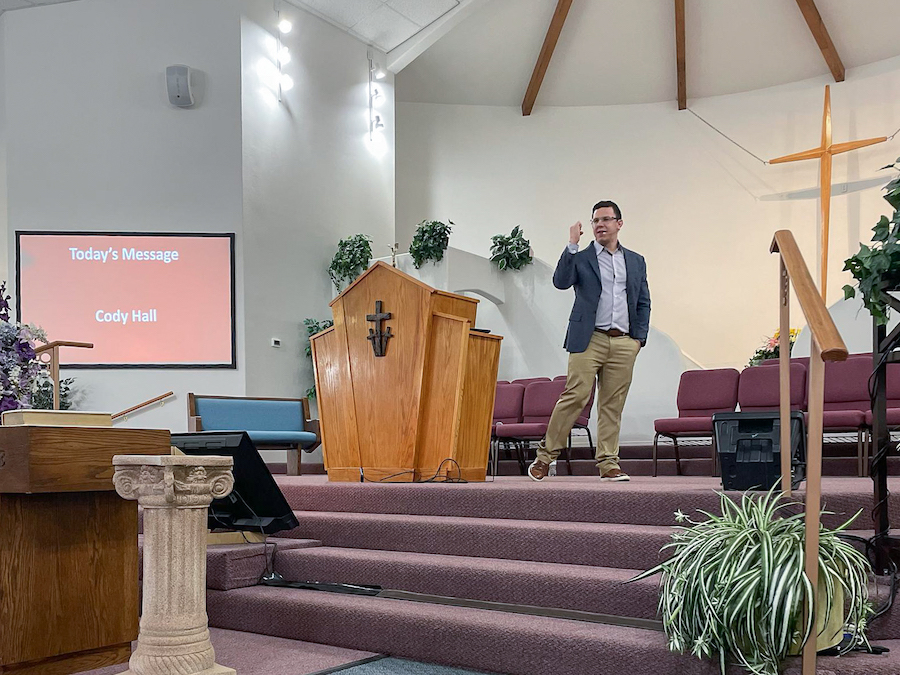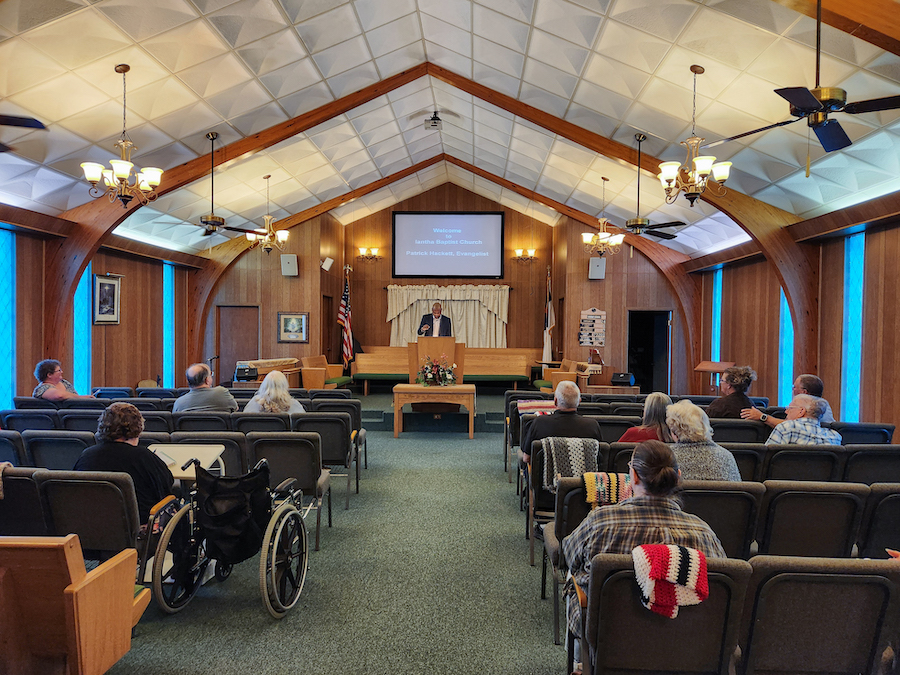Students preach the Gospel, learn classroom application through Revive this Nation

At the end of his week serving in Snowflake, Arizona, Cody Hall, a student in the 5-year program at Southwestern Baptist Theological Seminary and Texas Baptist College, saw “revitalized joy in the members and a hunger to reach the lost in Snowflake.”
Hall was one of 12 students who preached revival messages in 13 locations from California to Florida through Revive this Nation (RTN), an evangelism initiative of Southwestern Seminary that allows male students to preach revival services during Spring Reading Days. RTN, which has been also known as Pioneer Penetration, Operation Penetration, and Spring Practicum, has a “rich history dating back to 1959,” said Carl J. Bradford, interim associate dean of the Roy J. Fish School of Evangelism and Missions and faculty leader for RTN.
“Through serving churches across the nation, participants contribute to the mission of spreading the message of Christianity and engaging with Christian communities,” said Bradford, who also serves as assistant professor of evangelism and occupies the Malcolm R. and Melba McDow Chair of Evangelism. “Since 1959, God has used over 5,000 students to win 14,000 people to Christ and encourage thousands of churches to rekindle their flame for soul winning and spiritual maturity.”
During the five sermons he preached over four days at Valley View Southern Baptist Church in Snowflake, a community of 6,000 people located near the central region of Arizona, Hall said he “saw God bring one to salvation.”
Snowflake, founded in 1878 by Mormon pioneers Erastus Snow and William Flake, still has strong ties to its Mormon roots as “mostly all the people are Mormons,” Hall said. “Everyone was really nice, but lost.”
“Niceness does not get you to heaven,” Hall added.
Hall said that eight members of the church made commitments “to do evangelism with the church weekly.” The mayor of the town, who is a Mormon, attended the services when Hall preached on Monday night and he said “I pray a seed was planted.”
“My work is done there, but the Lord will continue the work,” he concluded.

Patrick Hackett, a Fort Worth native earning a Master of Arts in Christian Education (MACE) at Southwestern Baptist Theological Seminary, spent his time of service through Revive this Nation, preaching at Iantha Baptist Church in Iantha, Missouri.
Hall’s experience in Arizona was different than Patrick Hackett, a Fort Worth native earning a Master of Arts in Christian Education (MACE) at Southwestern. Participating for the second time in RTN, Hackett spent the week preaching in Iantha, Missouri, a town of 80 people.
Hackett said that the “Lord led me to preach a series on faith for His people,” during the five services he preached at Iantha Baptist Church. His messages were focused on Psalm 139, defining faith, the lives of Abraham and Noah, and explaining what it means to have faith the size of a mustard seed.
Hackett lodged in nearby Lamar, Missouri, the birthplace of United States President Harry S. Truman, and had the opportunity to interact with the people of Iantha “before and after the revival church services” that were preached beginning Sunday morning and concluded Wednesday evening.
“The people were warm, lovers of the Lord, and extremely hospitable,” Hackett reflected. “I have never had a church host me during a revival service the way that Iantha Baptist Church did this past week.”
His experiences during RTN helped Hackett see that “The Gospel of Jesus Christ is a bridge that can be used for us to walk into different cultures and environments with the sole purpose to minister a message of hope and salvation to a dying people and generation in need for Jesus Christ,” he said.
Through his second experience serving through RTN, Hackett said he “honestly” feels “that I have connected with lifetime friends and supporters of the ministry.”
Medford, Oregon, native Christopher Readus spent his first RTN experience serving in Lincoln, Arkansas, a “small, rural town that has economic challenges,” he said. Readus served at the First Baptist Church of Lincoln.
Readus, a MACE student with a concentration in discipleship, said the people he “met in the community during our door-to-door evangelism were somewhat open if they opened the door.” The community of Lincoln reminded him of “Southern hospitality,” he said.
“The church community is a tight-knit group that showed a lot of love to me, and I could also tell that they spent a lot of time together which was very nice to see,” Readus observed. “After church was over, they would spend time and talk with each other [which] was very nice to see. On Wednesday they have a community dinner and after dinner church service.”
Though the day-to-day of his Sunday through Wednesday time in Lincoln included preaching the revival services, sharing meals with the pastor and families from the church, and attending a gathering of Southern Baptist pastors, Readus said he was able to see his classroom instruction used in practical application.
When there was a death in the family who had been visiting the church, Readus said he “witnessed God use the church” as “the church rallied around the family and helped the kids with transportation and food [and] to get to the funeral.”
“I got to see how important the work and calling is that we have signed up for – in class it is all theory,” Readus explained. “But there is a hurting world that needs ministers, pastors, and disciples of Christ, and these individuals need to be able to reach the hearts and minds of the people.”
He added that “it is not just an academic lesson” as “people need more than just book knowledge.”
“If we cannot relate to them, we will not be able to earn their trust,” Readus concluded.
The experience through RTN also helped Readus confirm his calling as he is “not wrestling with [my] calling anymore. I am sure that God called me into ministry.”
Bradford said that the involvement of students in RTN “goes beyond mere training for the pastorate” but rather “it represents a significant step towards revival, touching hearts, and actively fulfilling the Great Commission.”
“It presents a unique opportunity for students to embrace their role as agents of change, catalyzing spiritual renewal in our churches and paving the way for future ministry,” Bradford concluded.



